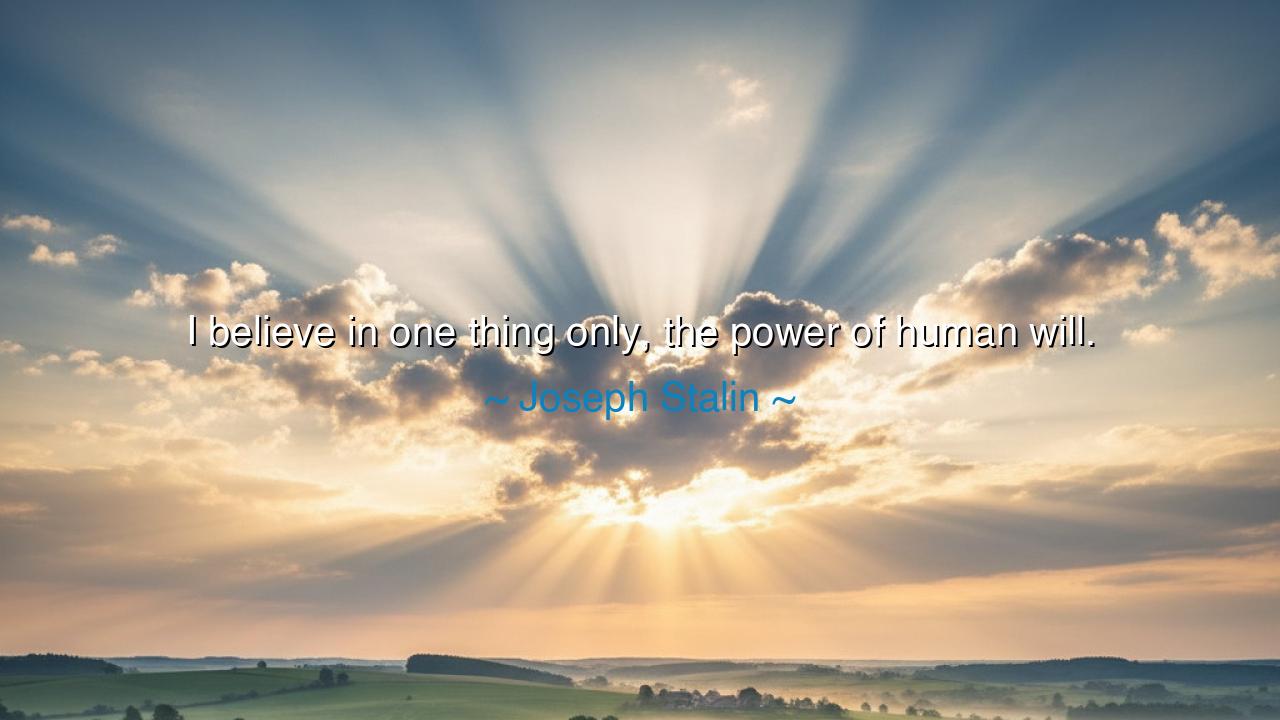
I believe in one thing only, the power of human will.






In the vast theater of history, few forces have shaped the destiny of nations more than the human will. When Joseph Stalin proclaimed, “I believe in one thing only, the power of human will,” he was not merely speaking of individual strength, but of an indomitable force that can move mountains, topple empires, and rebuild worlds. The will is like fire: it can warm and sustain life, or it can consume and destroy. In its purest form, it is the essence of determination—the refusal to surrender, even when surrounded by darkness.
The human will is the inner flame that rises when all else fails. Wealth may be stolen, armies may be broken, and kingdoms may fall, but the will of a person or a people cannot be conquered unless they themselves relinquish it. This is why throughout history, the oppressed have risen against the mighty, and the weak have overthrown the strong. To believe in the power of will is to place faith in the unseen strength that dwells within every soul, capable of shaping fate itself.
Stalin’s life itself was a testament to this relentless belief. Born in poverty in the harsh land of Georgia, scarred by illness and hardship, he rose from obscurity to become the ruler of the vast Soviet Union. Through sheer determination, cunning, and ruthless resolve, he bent the course of history to his vision. During World War II, when the Nazi war machine threatened to crush his nation, Stalin called upon the will of the Soviet people to endure unimaginable suffering. At Stalingrad, a city that bore his very name, soldiers and civilians alike stood firm against overwhelming odds, ultimately turning the tide of the war. Their collective will became a wall of iron that even the most powerful army in the world could not breach.
Yet, the story of Stalin also reveals the peril of will untempered by wisdom or compassion. For while his determination built industries, modernized armies, and defended his land, it also wrought terror and suffering through purges and oppression. This teaches us that will alone is not inherently good or evil—it is a tool, and its morality depends on the heart that wields it. A tyrant’s will can enslave millions, while a hero’s will can free them.
Therefore, let future generations understand: the human will is the mightiest force in existence, greater than swords, gold, or crowns. Cultivate it within yourself, for it will carry you through storms and trials. But guard it well, lest it consume you and others. For as the ancient masters taught, true strength lies not merely in unyielding determination, but in directing that power toward justice, harmony, and the upliftment of all. Only then can the flame of will light the world, rather than burn it to ashes.






TADo Le Tuan Anh
I feel a mix of admiration and unease toward this statement. It celebrates human potential, yet the association with Stalin makes me wonder about the ethical dimension of unyielding will. Can devotion to willpower justify extreme actions if one truly believes in their purpose? I’d like to explore whether it is possible to harness the power of human determination in a way that is constructive and ethical, rather than destructive.
HTBinh An Hoang Thi
This quote provokes me to think about the psychology of determination. Can belief in the power of will change our mindset enough to create tangible results, or is it more of a motivational philosophy than a practical principle? I’m curious whether people who adopt this mindset see measurable benefits in resilience, persistence, or creativity. Additionally, how does this philosophy interact with humility or the ability to recognize one’s limitations?
PBPhuc Bui
Reading this, I can’t help but reflect on the tension between personal agency and structural limitations. Does this idea imply that failure is always a result of weak resolve rather than external circumstances? How much of our achievements can truly be attributed to willpower versus opportunity, privilege, or timing? I’d love to explore whether glorifying will alone risks oversimplifying the complex dynamics that determine success and survival.
ATAnh Thu
I find this perspective both inspiring and troubling. It suggests that individuals can shape their destiny purely through inner strength, yet history shows that even the strongest wills can be thwarted by larger forces. Could extreme belief in willpower justify ruthless or uncompromising behavior? I’d like to hear thoughts on whether unwavering focus on human will can be morally neutral, or if it inevitably intertwines with ethical consequences.
DDh
This statement makes me question the limits of human determination. Can sheer willpower truly overcome all obstacles, or are there circumstances where external factors—like resources, luck, or social support—play a more decisive role? I wonder if emphasizing will alone risks ignoring the importance of collaboration, strategy, and context. Is this belief empowering or potentially dangerous when applied without balance or consideration of reality’s constraints?